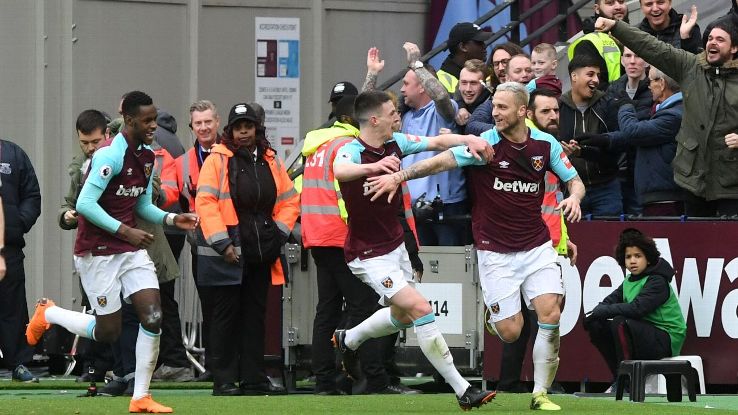


LONDON — About half an hour before West Ham’s home game against Southampton, one steward at the London Stadium nodded to another. “Any trouble?” he asked a little nervously. His colleague shook his head as if to say, ‘No, it’s been fine so far.’ Around the ground, the atmosphere seemed quiet, apprehensive about what was to come.
Strung around the side of the pitch were 56 extra stewards, facing the crowd. Many, if not all, were wearing football boots — a rare bit of shrewd, forward planning in anticipation that they would have to chase disgruntled supporters across a wet pitch. The proper footwear would protect them against the indignity of slipping while in full pursuit. Some even had protective goggles.
It may have been straight from the “stable door, post-horse bolting” files, but West Ham were doing their best to ensure there would be no repeat of the protests that overshadowed their game against Burnley a few weeks ago. The theme of the pre-match message was positivity, urging fans to get behind the boys: the co-owners, writing a rare joint article in the matchday programme, said so, manager David Moyes said so and even Marlon Harewood, West Ham striker from 2003-07, said so as he was interviewed before kick-off.
Ultimately, none of it would be any use if the team were as desperate as they have been for much of this season. The general state of the club, its ownership and the stadium itself are the cause of the general dissatisfaction, but that was just the spark: It was West Ham’s on-pitch performance and falling behind 1-0 to Burnley that set it alight.
“Things have been simmering since our very first game at our new home,” David Blackmore, editor of West Ham fanzine Blowing Bubbles, told ESPN FC, “and the Burnley game saw the feelings of some fans boil over.
“What I often wonder is what would the feelings be today if we’d started life at our new home in the same form that we enjoyed at our former home and had two similar seasons. I suspect things would have been hugely different.”
Saturday, all that changed within 13 minutes. As it turned out, some of those extra stewards were required, but instead of preventing angry fans from confronting players, their job became stopping joyous ones from mobbing Joao Mario after he hammered the opener into the roof of the net.
At that point, the atmosphere was relief mixed with nerves. The thing about relegation battles is every emotion becomes amplified, both the positive and the negative, and for a few minutes, there seemed to be a mixture of the two. So even after taking the lead, West Ham’s fans were still prepared for the worst, like a nervous flyer during turbulence who is expecting doom.
There were groans when Michail Antonio and then Marko Arnautovic went down. You could almost hear the fans sighing, “It was all going so well, but now the overpowering force of relegation has taken everything positive from us.” But then Arnautovic scored twice, one a follow-up from his own saved header, the other a brilliant first-time volley from a David Beckham-esque (genuinely) cross by Arthur Masuaku (genuinely).

“The players showed how they felt from past events,” said Moyes afterward. “They were pent up and ready to go.” After the second goal, the mood became lighter than a bubble, as a crowd finally believed they could enjoy the rest of the afternoon.
Well, most of the crowd, at least. At half-time, Southampton were booed off by the travelling support, and at the end, they couldn’t even muster such displeasure. The visitors were abysmal, devoid of scrap, fight and bottle, nebulous concepts that are tricky to define but obvious to anyone watching. But they also lacked quality, invention and incision: On Saturday’s evidence, there was only one side who looked set for relegation.
It was as if Southampton were on a 90-minute mission to disprove the notion of the new manager bounce, with the 17-day gap between Mark Hughes’ appointment and his first league game perhaps proving detrimental. After the game Ryan Bertrand made his way apologetically over to those Saints fans who had grimly stuck around so he could give his shirt to a youngster; it felt more like an apology than a gift.
“There were catastrophic errors that have been prevalent for quite some time,” said Hughes afterward. “We didn’t give West Ham a game, unfortunately.
“Today was a good learning experience because it told me about the group I’ve got to work with,” he continued, a fairly damning statement given what everyone had just witnessed. Hughes hasn’t been here long, but this was a Southampton performance we’ve been used to watching all season — one without an identity, little edge, no sense of a plan and steadily trending down. They’re in the bottom three, only two points from safety, but with little indication they have enough to scrap themselves out of this mess.
West Ham, meanwhile, now have 33 points with seven games left. You suspect two more wins will see them safe, and even with everything else going on at the club, that is the key goal. “Avoid relegation,” said Blackmore when asked what will satisfy the crowd. “It’s simple. And for us to see 11 players who week-in, week-out give their all for West Ham. We know we won’t win every week, but we want players who can dig deep and entertain.”
They managed exactly that against Southampton, but the test now is whether this represents more sustained change or a mere short-term reaction, a little like children cleaning their room and doing their homework immediately after being told off by their parents, only to slip back into their old ways a week later.
“Sometimes these games change clubs,” said Moyes. This win certainly won’t.
Nick Miller is a writer for ESPN FC, covering Premier League and European football. Follow him on Twitter @NickMiller79.

Be the first to comment